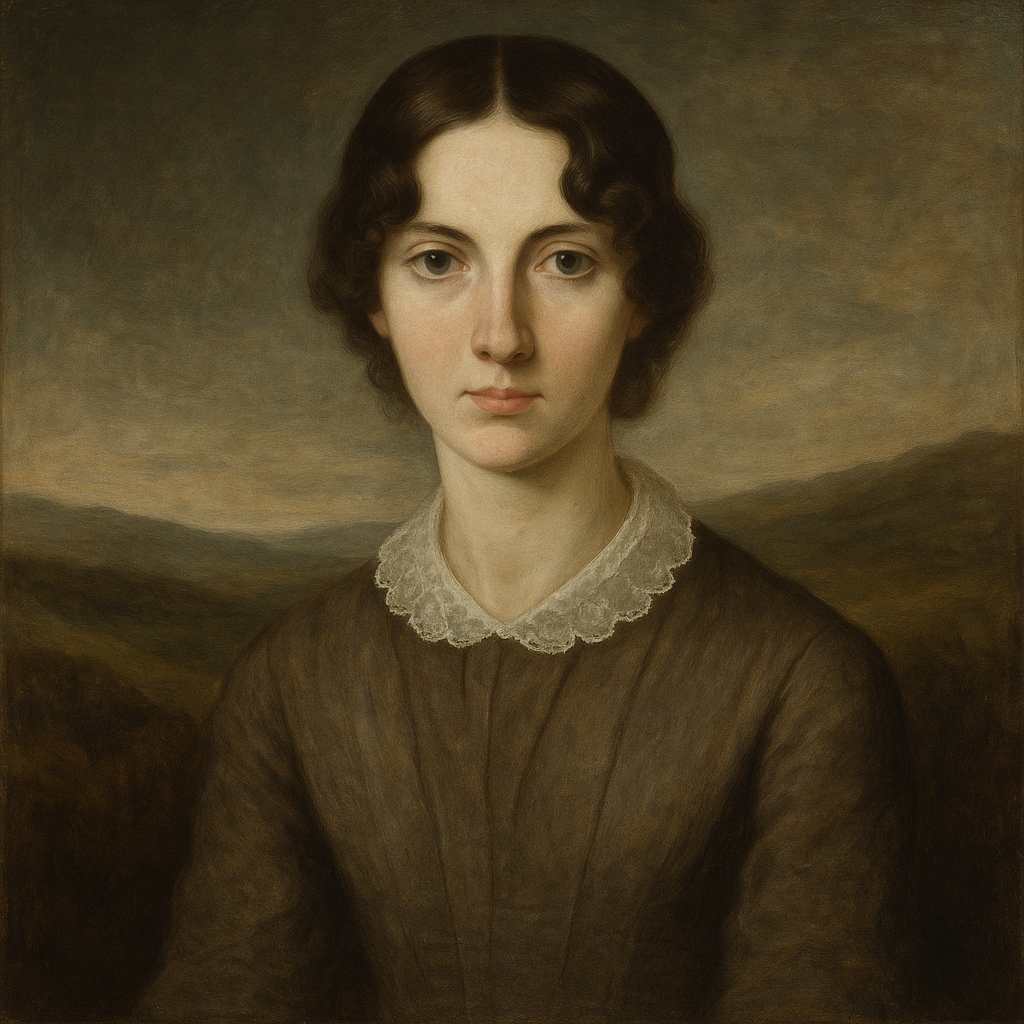Mild the mist upon the hill
Emily Brontë
1818 to 1848

Mild the mist upon the hill
Telling not of storms tomorrow;
No, the day has wept its fill,
Spent its store of silent sorrow.
O, I'm gone back to the days of youth,
I am a child once more,
And 'neath my father's sheltering roof
And near the old hall door
I watch this cloudy evening fall
After a day of rain;
Blue mists, sweet mists of summer pall
The horizon's mountain chain.
The damp stands on the long green grass
As thick as morning's tears,
And dreamy scents of fragrance pass
That breathe of other years.
Emily Brontë's Mild the mist upon the hill
Introduction
Emily Brontë's "Mild the mist upon the hill" is a poignant exploration of memory, nostalgia, and the intricate relationship between nature and human emotion. This sixteen-line poem, with its deceptively simple structure, reveals a complex interplay of sensory imagery and temporal shifts that invite deeper analysis. As we delve into the layers of meaning within this work, we will uncover how Brontë masterfully weaves together themes of childhood innocence, the passage of time, and the enduring power of sensory experiences to evoke profound emotional responses.
Analysis of Form and Structure
The poem consists of four quatrains, each following an ABAB rhyme scheme. This regular structure provides a sense of stability and continuity, mirroring the comforting nature of the memories described. The meter, while not strictly consistent, generally follows an iambic rhythm, with occasional variations that create a subtle musicality reminiscent of natural speech patterns.
This formal choice is significant, as it reflects the poem's thematic focus on the intersection of order and unpredictability in both nature and human experience. The regularity of the rhyme scheme contrasts with the fluid, mist-like quality of the imagery, creating a tension that underscores the poem's exploration of the ephemeral nature of memory and perception.
Imagery and Sensory Experience
Brontë's use of imagery is particularly striking in this poem, relying heavily on visual and tactile sensations to create a vivid, immersive experience for the reader. The opening lines, "Mild the mist upon the hill / Telling not of storms tomorrow," immediately establish a sense of softness and tranquility. The mist serves as both a literal description of the landscape and a metaphor for the hazy quality of distant memories.
As the poem progresses, the imagery becomes increasingly layered and evocative. The "blue mists" and "sweet mists of summer" not only describe the physical environment but also suggest a kind of emotional filter through which the speaker views her past. The damp that "stands on the long green grass / As thick as morning's tears" creates a powerful synaesthetic effect, blending visual and tactile sensations with the implicit emotional resonance of tears.
This rich sensory palette culminates in the final lines, where "dreamy scents of fragrance pass / That breathe of other years." Here, Brontë introduces olfactory imagery, recognizing the potent ability of scents to trigger memories and emotional responses. This progression from visual to tactile to olfactory sensations mirrors the deepening of the speaker's engagement with her memories, moving from surface observations to more profound, visceral experiences.
Temporal Shifts and Narrative Voice
One of the most intriguing aspects of "Mild the mist upon the hill" is its complex treatment of time. The poem begins in the present tense, describing the current state of the misty hill. However, by the fifth line, there is a sudden shift: "O, I'm gone back to the days of youth, / I am a child once more." This abrupt transition from present to past creates a sense of temporal disorientation, reflecting the way memories can suddenly and vividly overtake our present consciousness.
The narrative voice also undergoes a transformation throughout the poem. Initially, it appears to be that of an adult observer, but as the speaker is transported back to childhood, the perspective shifts to that of a young girl watching the evening fall from the safety of her father's home. This dual perspective allows Brontë to explore the interplay between adult reflection and childlike wonder, creating a rich, multifaceted emotional landscape.
Themes of Nostalgia and Loss
At its core, "Mild the mist upon the hill" is a deeply nostalgic poem, suffused with a sense of longing for a lost past. The speaker's return to childhood is portrayed not just as a pleasant reminiscence, but as a kind of emotional refuge. The phrase "'neath my father's sheltering roof" suggests a desire for protection and security that the adult world may lack.
However, this nostalgia is tinged with melancholy. The day that "has wept its fill, / Spent its store of silent sorrow" hints at a deeper emotional undercurrent. The very act of remembering implies a recognition of what has been lost to time. The mists that "pall / The horizon's mountain chain" can be read as a metaphor for the way memory obscures and softens the harsh realities of the past.
Nature as Emotional Landscape
Brontë's treatment of nature in this poem goes beyond mere description. The natural world becomes a canvas upon which human emotions are projected and reflected. The mist, the rain, the damp grass – all serve as external correlatives for internal emotional states.
This technique, often associated with the Romantic poets, allows Brontë to explore complex feelings without resorting to direct exposition. The "silent sorrow" of the day, for instance, suggests a depth of emotion that remains largely unspoken but is palpable in the atmosphere of the poem.
Moreover, the cyclical nature of weather patterns – the rain that has passed, the mist that lingers – mirrors the cyclical nature of memory and emotion. Just as the landscape will inevitably change with the passing of seasons, so too do our memories and feelings evolve over time.
The Power of Sensory Memory
Perhaps the most profound aspect of "Mild the mist upon the hill" is its exploration of the power of sensory experiences to evoke memories and emotions. The poem demonstrates an acute understanding of how our senses can serve as gateways to the past, triggering vivid recollections and powerful emotional responses.
This is most evident in the final lines, where the "dreamy scents of fragrance" breathe of "other years." Here, Brontë taps into the well-documented connection between smell and memory, recognizing that certain scents have the ability to transport us instantly to specific moments in our past.
By emphasizing these sensory experiences, Brontë suggests that our connections to the past are not purely intellectual or emotional, but are deeply rooted in our physical, embodied experiences of the world. This understanding adds a layer of universality to the poem, as readers can relate to the experience of being suddenly and unexpectedly transported to their own pasts by a particular sight, smell, or sensation.
Conclusion
"Mild the mist upon the hill" stands as a testament to Emily Brontë's poetic skill and emotional insight. Through its careful balance of form and content, its rich sensory imagery, and its nuanced exploration of memory and nostalgia, the poem offers a profound meditation on the nature of human experience and our relationship to the past.
Brontë's ability to capture the complex interplay between present perception and past memory, between adult reflection and childlike wonder, creates a work of surprising depth and universality. The poem invites readers to consider their own relationships with memory and the natural world, encouraging a kind of introspection that extends far beyond the boundaries of its sixteen lines.
Ultimately, "Mild the mist upon the hill" reminds us of the enduring power of poetry to articulate the most subtle and complex aspects of human experience. It stands as a shining example of how the skillful use of language and imagery can create a work that is at once deeply personal and universally resonant, inviting readers to lose themselves in the mists of their own memories and emotions.
This text was generated by AI and is for reference only. Learn more
Want to join the discussion? Reopen or create a unique username to comment. No personal details required!



Comments
No comments yet. Be the first to comment!